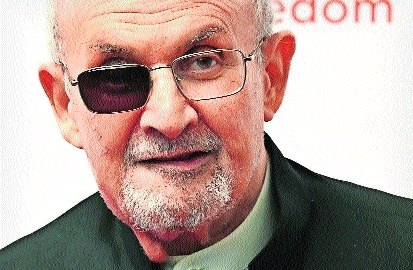Of seeing the whole picture
17 Dec 2024 11:55:34
Salman RushdieBy Vijay Phanshikar :“The only people who see the wholepicture”, he murmured, “are the ones who step out of the frame.”- Salman Rushdie
THIS basic truth is often missed in the humdrum of life. But even a little
scratching beneath the surface brings us to its awareness.
Of course, Salman Rushdie has talked of a tough reality -- of how one really knows the truth. This is almost universally right -- for if one wants to take a good look at the complete picture, then one must step out of the picture, walk some distance away from it, turn back and then pan one’s eyes from this side to that and up and down to take in the whole scene, the whole picture.

Many people may have
different takes on this simple but core thought of bringing to light the truth of many a thing. Some may even want to contest its substance. Some may even
suggest that Salman Rushdie has said smart words only to catch attention.
This charge would, of course, be unfair not just to Rushdie but also to the whole world, the whole life as such. For, as is the universal experience, all of us, each one of us without exception engages self in
stepping out of the picture to be able to see it completely.
Let us imagine how a painter or a
sculptor or an artisan works. Say, he is carving a beautiful human face out of a rough hewn rock. He places the rock on a firm footing and secures its position before he picks up his chisel and hammer and starts chipping carefully, calculatedly -- as per the picture he has in mind. He works for some time, carves out, say, the statue’s head. Then he takes a pause, steps back a little, tilts his head this or that way -- to take a good look at how the project is
proceeding.
That little pause, that little stepping back are essential for the artist to be able to assess how the work is progressing.
That gives him a rather correct assessment of how he is handling the task at hand. That stepping back, that taking a pause, that tilted head, those squinted eyes to take a closer look give him a good idea of the shape of the piece at hand.
This is exactly what Salman Rushdie is talking about, in a way. If you want to take a good look at the complete picture, you must step out of the frame, go away from the confines of the picture, and then take a good, close look at how things are going.
Of course, there are many who wish to correct the wrong in organisations, so to say. To such people, wise men advise: ‘Come on, you cannot correct an
organisational wrong from outside. If you go out, out you go. So, stay put. So, stay on. So, stay within -- so that you will have access to the process of correcting the wrong. If you move out, then you will be termed as an outsider, and then you would not be allowed do anything to the place that you have opted out of. So, hang on -- so that you can effect a correction.’
True, this advice has substance that we cannot afford to ignore.
Yet, it is essential to understand the mechanics and dynamics of understanding the complete truth, the
complete picture. In simple words, that mechanics and dynamics is to step out of the frame that holds a scene within confines, move a little away from the scene, take a pause, tilt your head, squint your eyes -- and then realise the detail of the full
picture.
This process may appear simple -- as Salman Rushdie has spent his energies in making it sound simple for the benefit of all of us. But for those who pick up courage to step out of the frame to know the
complete picture, the complete truth, things are never easy.
For, on one hand, they stand isolated. Two, they also are treated with contempt by others who choose to stick on -- despite serious issues and problems inside the frame. ... !
George Orwell describes such a situation from another angle in his seminal work ‘Animal Farm’. He talks of how the animal-inmates of an animal farm decide to push out the manager of the place because he is despotic in nature. And then, after chasing the man out, the inmates take over the management in their own hands. And from within, they realise the problems -- real problems. For, as they launch the
take-over, the inmates declare: ‘All animals are equal’. Means, the cat on the farm
cannot eat the mouse. Everybody starves. Things go out of hand, so to say.
So, one day, the inmates decide, ‘All
animals are equal, but some animals are more equal than others’. So, the cat can eat the mouse .. and so on.
Back to Salman Rushdie, the statement has substance: If you want to know the complete picture, you must step out and see the truth -- from a distance.
From within the animal farm, the
complete truth -- of cat not being able to eat the mouse -- cannot be seen.
